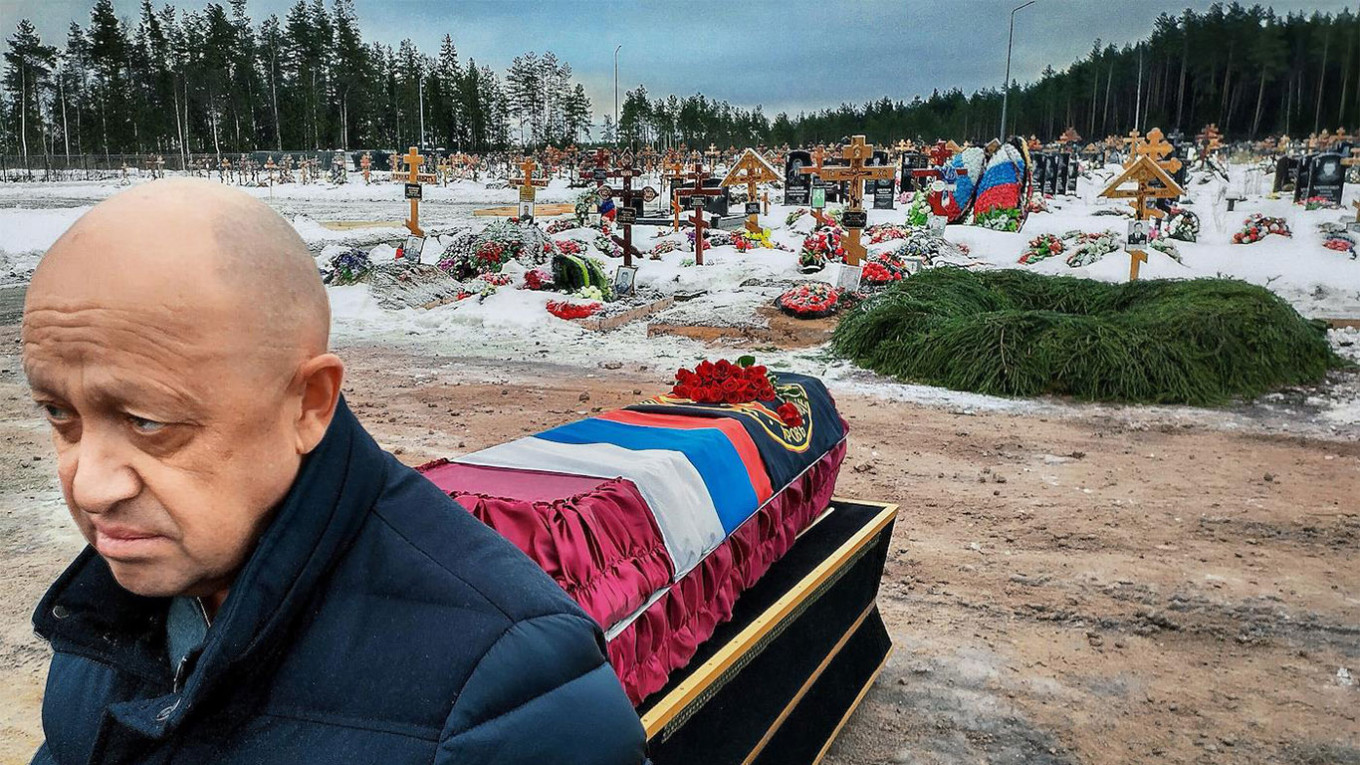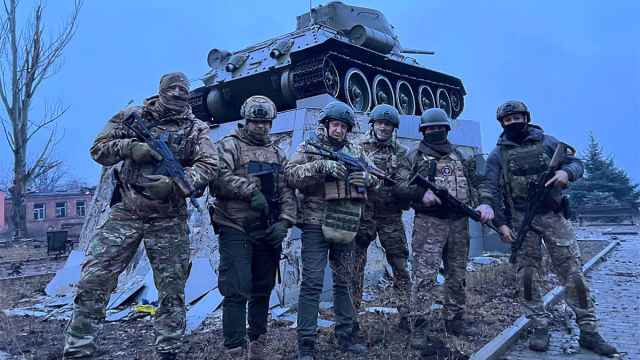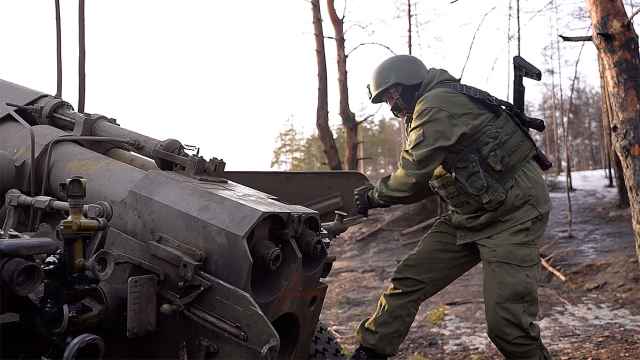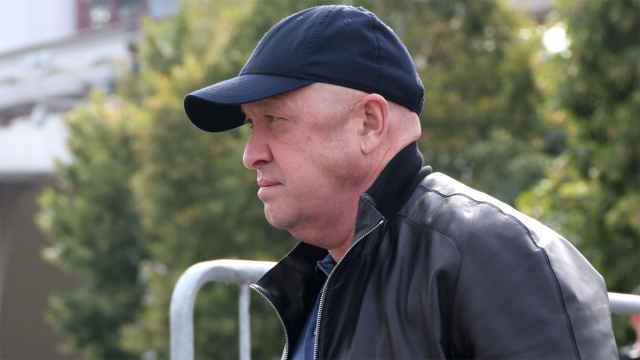The final resting places of mercenaries killed while fighting for Russia’s Wagner Group are hard to miss, standing out from other graves with their colorful adornments.
Most are marked by a wooden cross, with the heaped earth covered by green spruce branches and two wreaths: one in the colors of the Russian tricolor and the other in the red-and-yellow colors of the Wagner emblem.
Each grave bears a sign reading: "Blood. Honor. Motherland. Courage. PMC Wagner."
The discovery of mass burial sites for slain Wagner fighters has shed light on the mounting death toll suffered by Russian forces in Ukraine as the conflict enters its 15th month.
While there are no official figures available for Wagner’s war losses, thousands of its mercenaries are believed to have died in combat, particularly in the heavily contested city of Bakhmut, where these soldiers-for-hire have played a prominent role.
In February, U.S. officials claimed over 30,000 Wagner fighters had been injured or killed.
To date, Wagner cemeteries have been discovered as far away from the frontline as Siberia’s Irkutsk region, while others are as close as the Russian-occupied city of Luhansk in eastern Ukraine.
The Wagner Group’s leader, businessman Yevgeny Prigozhin, has publicly acknowledged the existence of several of these sites.
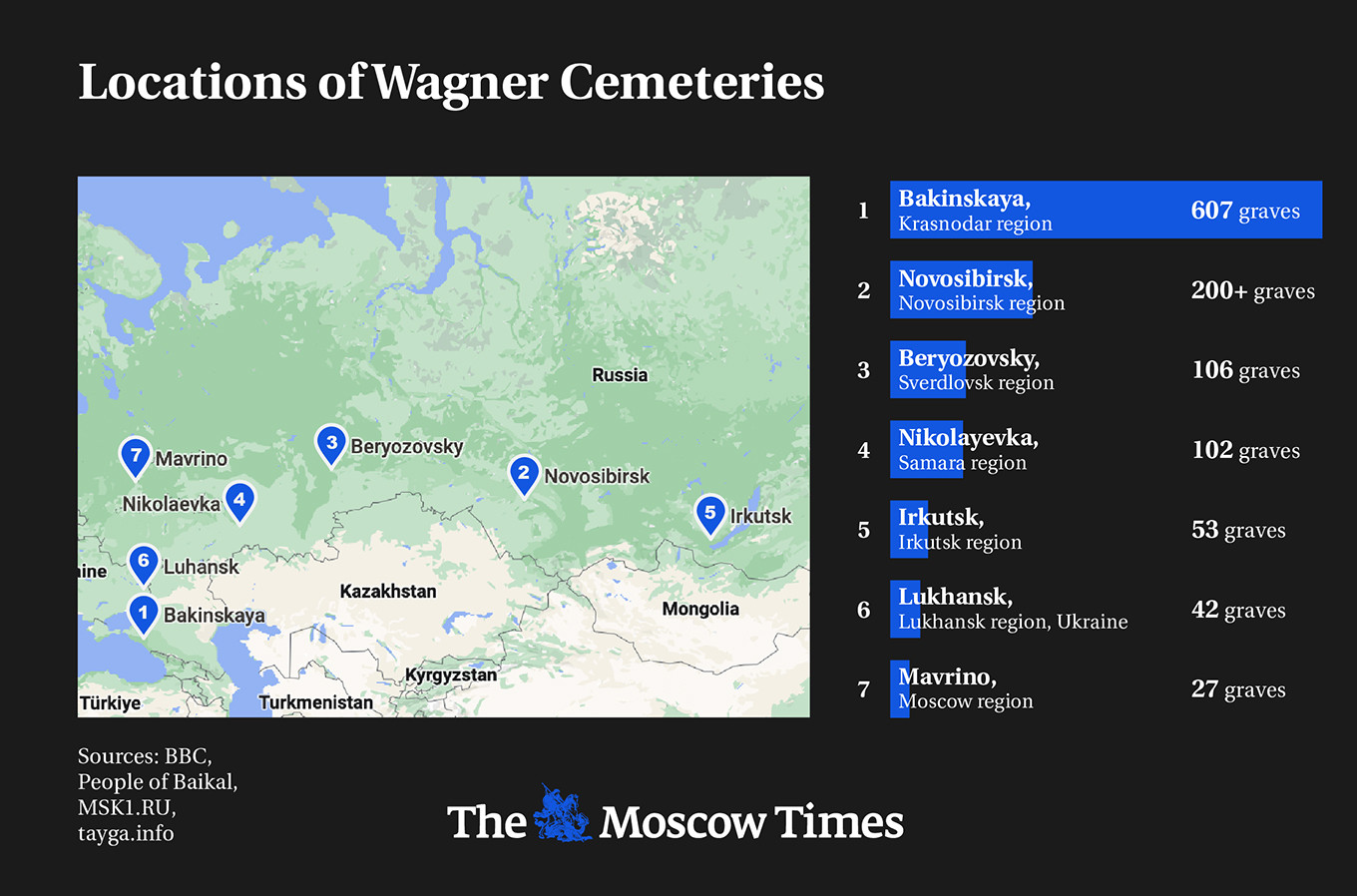
Others have been discovered by journalists, activists or local residents.
Many of the dead are convicted criminals who were recruited from prisons last year as Moscow desperately sought to boost the number of soldiers it could deploy in Ukraine.
In total, independent Russian journalists have documented more than 1,000 Wagner graves.
As of April 14, the BBC Russian service and independent media outlet Mediazona have confirmed the deaths of 1,112 Wagner fighters.
In addition, the two outlets have confirmed the deaths of 3,080 recruited convicts in Ukraine — while most of these are believed to have fought for Wagner, others were likely recruited into Russia’s regular Armed Forces.
Olga Romanova, the head of the prisoners’ rights group Russia Behind Bars, told The Moscow Times she believes some 30,000 prisoners recruited by Wagner have been killed in Ukraine, suggesting that the number of Wagner cemeteries will grow rapidly in the coming weeks and months.
The Moscow Times has compiled a comprehensive list of the burial sites found so far:
Novosibirsk, Novosibirsk region (200+ graves)
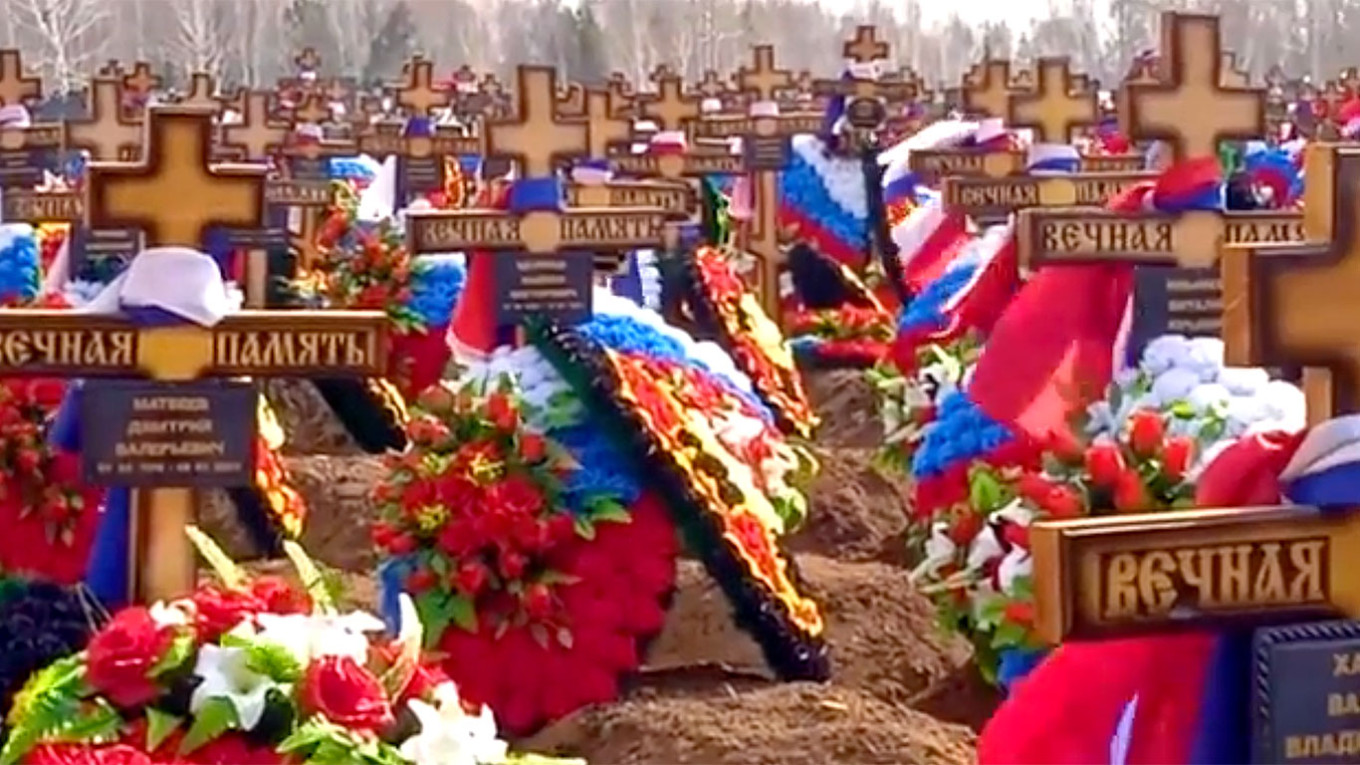
In early April, a group of volunteers happened upon 69 fresh graves at the Gusinobrodsky cemetery in the Siberian city of Novosibirsk. By April 25, that figure had increased by about 200, according to the independent news outlet Tayga.Info.
The sister of one of the buried individuals told the BBC Russian service this month that her brother signed a contract with Wagner in early September while in prison.
When the burial site was first discovered, BBC journalists matched the inscriptions on the gravestones to the details of 52 men — 41 of whom had criminal backgrounds.
The majority of the men in this cemetery had come from the neighboring Krasnoyarsk region, according to the BBC Russian service. But journalists at Tayga.Info discovered that some of the more recently buried fighters came from the Kemerovo region and the republic of Tuva.
Irkutsk, Irkutsk region (53 graves)
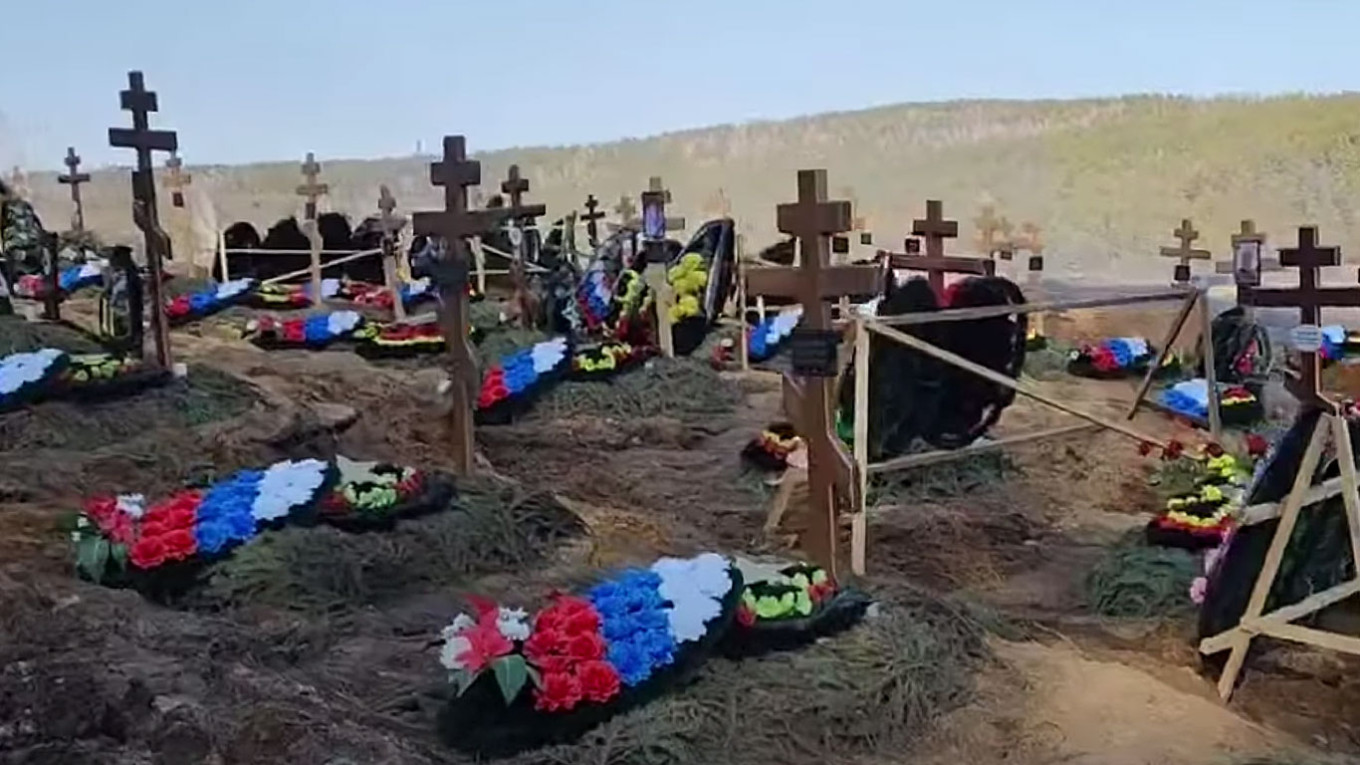
Journalists at the independent People of Baikal news outlet last month uncovered 53 Wagner graves in a corner of the Aleksandrovsky cemetery, located some 11 kilometers from the regional capital of Irkutsk.
According to People of Baikal, court records showed 43 of the graves belonged to convicts. At least some of the dead had been killed in combat in Bakhmut.
Work was ongoing on dozens more graves when volunteers for People of Baikal visited the Irkutsk site in early April. Since the earth in the Siberian region is still frozen at this time, workers had built fires in half-dug graves to thaw the ground.
As with other cemeteries, some of the relatives of killed fighters found at the Aleksandrovsky cemetery were reportedly not informed by Wagner of their deaths.
The private army’s reluctance to contact family members of fighters killed in action is unsurprising given the 5 million rubles ($61,218) it has pledged to pay to loved ones, Romanova told The Moscow Times.
In addition, Romanova said that Wagner had been denying recruited convicts the ability to communicate with their families.
“Prisoners signed contracts in which they agreed that under no circumstances would their personal information be shared with anyone, including relatives. That was a condition,” she said.
Beryozovsky, Sverdlovsk region (106 graves)
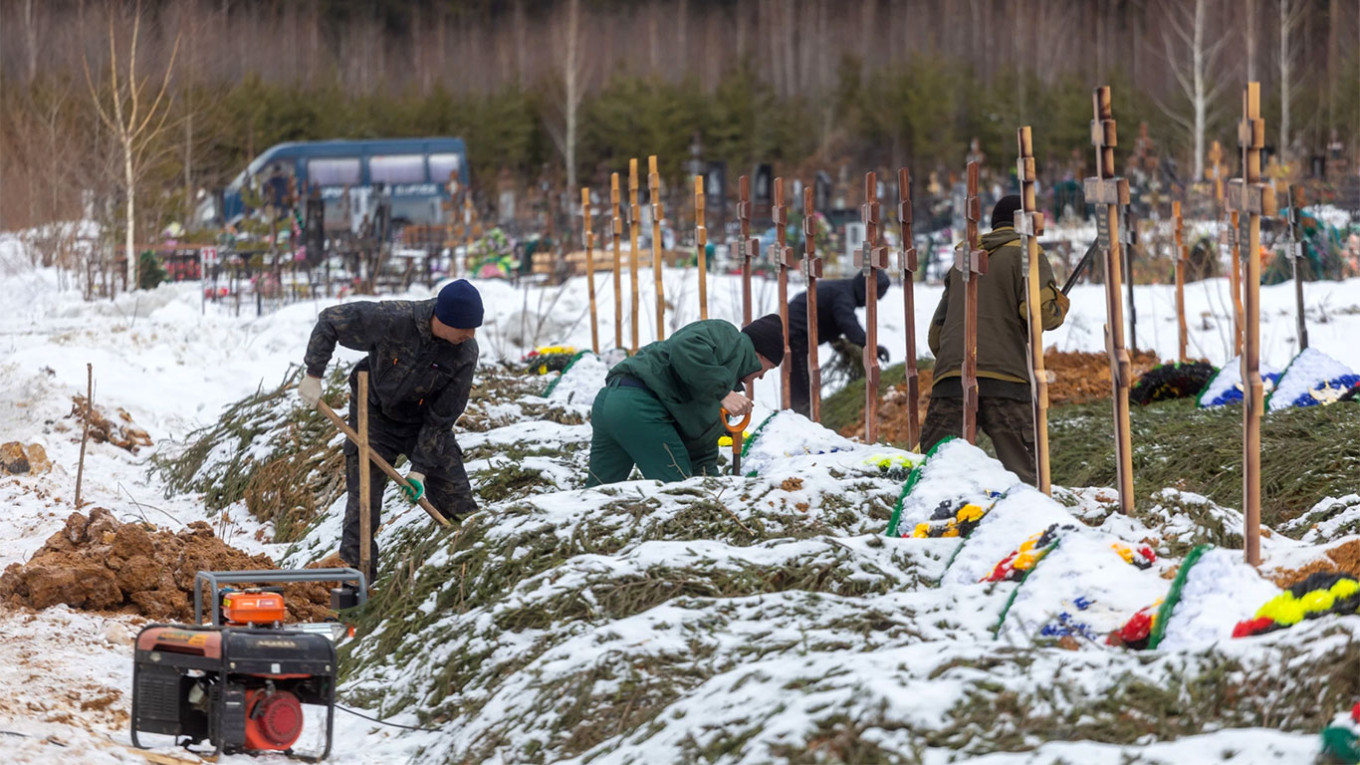
Located in the town of Beryozovsky in the Ural Mountains region of Sverdlovsk, this burial site was first reported by journalists from local news site E1.Ru on March 16.
The funeral service responsible for the burials informed E1.Ru journalists that the dead Wagner soldiers were interred at the cemetery when their relatives could not be reached.
Wagner Group leader Prigozhin confirmed this practice last month, acknowledging the existence of the Beryozovsky cemetery. A funeral service employee clarified to E1.Ru that none of the soldiers buried in Beryozovsky were locals.
“Where soldiers are buried is completely random,” said activist Romanova.
As of April 11, the estimated number of Wagner graves at Beryozovsky was 106, according to BBC Russian service figures.
Nikolayevka, Samara region (102 graves)
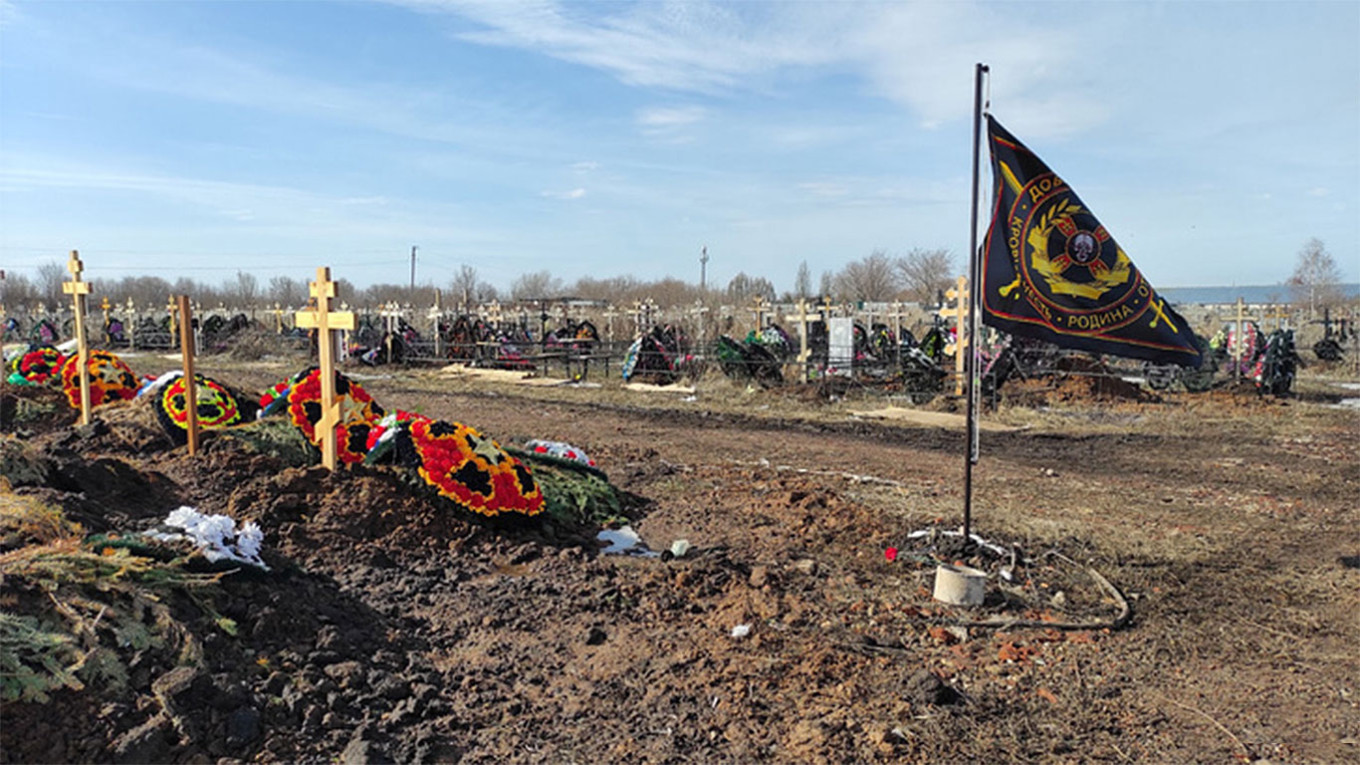
Locals in the village of Nikolayevka in the Volga River region of Samara discovered a Wagner burial site in a nearby cemetery in early March.
The most recent estimates by the BBC put the number of graves at 102.
Bakinskaya, Krasnodar region (607 graves)
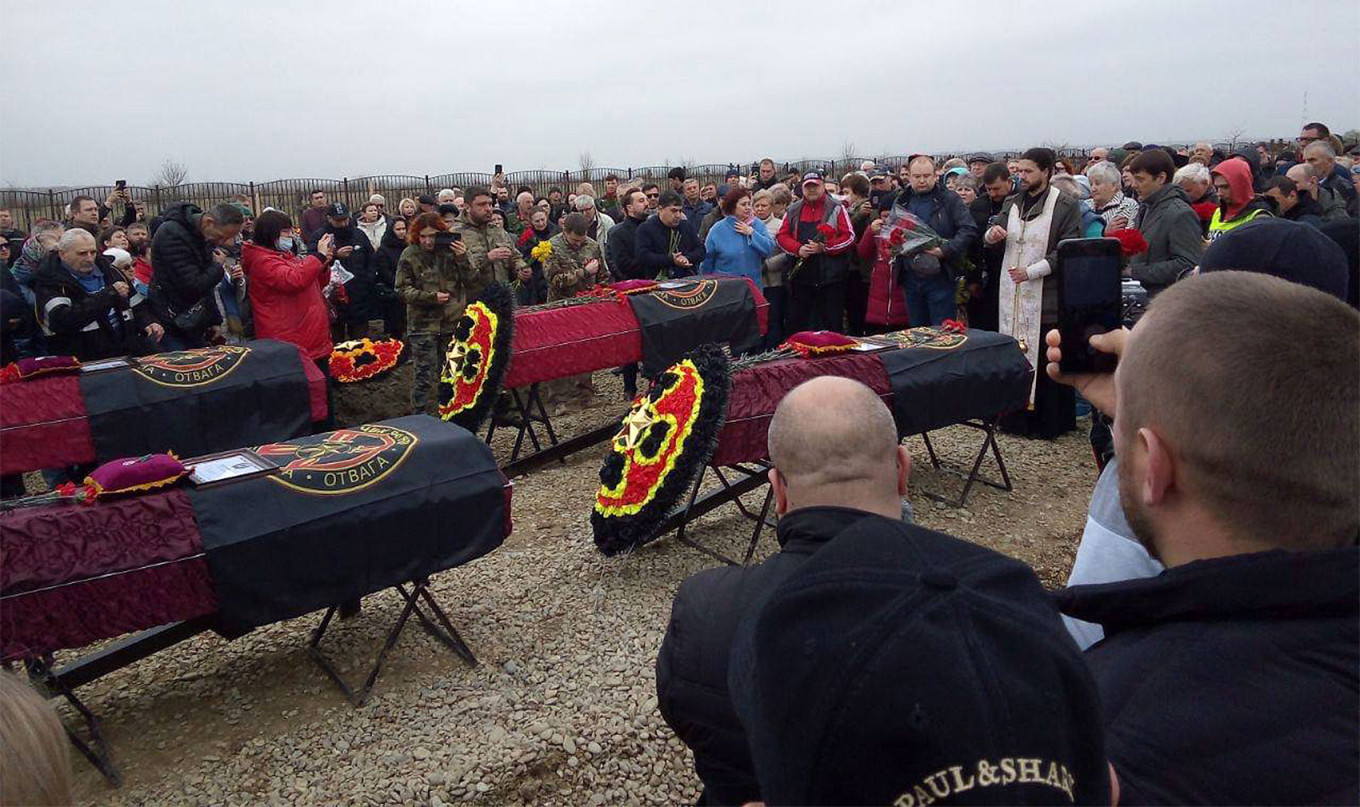
By far the largest and most well-known of the Wagner cemeteries to appear since the start of the war, Bakinskaya contains the graves of more than 600 Wagner fighters.
Like other Wagner cemeteries, it contains graves of men whose families do not know they were killed, according to activist Vitaly Votanovsky, who has documented the deaths of Russian soldiers in Ukraine by monitoring graveyards in the southern Krasnodar region.
"In the Bakinskaya cemetery, I discovered that only two out of 600 soldiers buried there were officially listed as killed. All the others were quietly buried. Nobody knew about them," Votansky told The Moscow Times in a recent interview.
Prigozhin visited Bakinskaya earlier this month and pledged to turn it into a “memorial for future generations.” He admitted that the graveyard was growing, adding "that's the way life is."
Mavrino, Moscow region (27 graves)
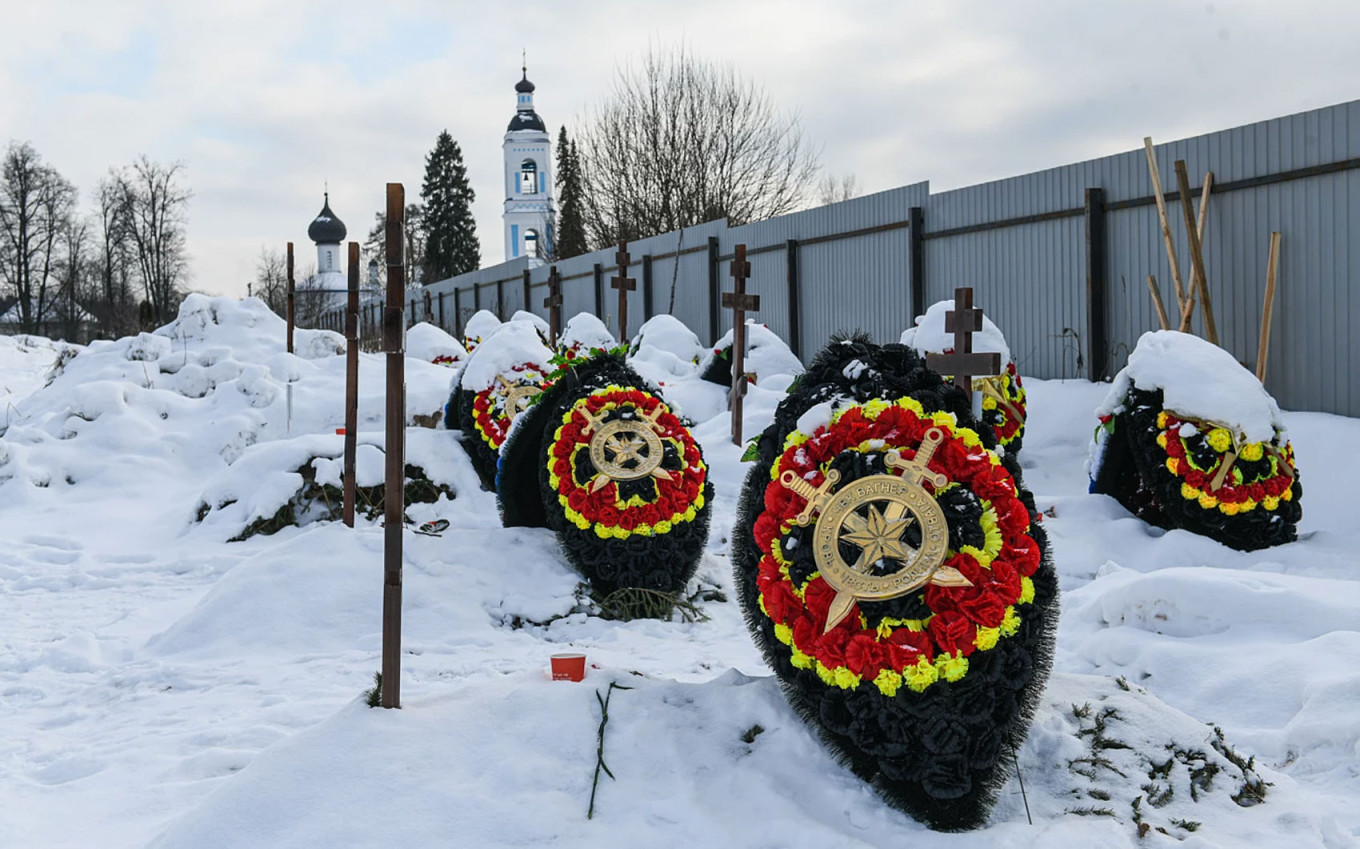
In the village of Mavrino, some 80 kilometers southeast of Moscow, residents first noticed the appearance of dozens of identical Wagner graves at their local cemetery in mid-January.
The most recent tally by local journalists put the total number of graves at 27.
While Prigozhin has not explicitly acknowledged that the Mavrino burial site belongs to Wagner, he said last month: “It’s not surprising that some of our heroes are buried in the village of Mavrino or in other places of our vast motherland for which we die.”
When contacted by journalists at the local news website MSK1.Ru, local authorities refused to disclose information regarding the grave site.
Kirovka, Luhansk, Ukraine (42 graves)
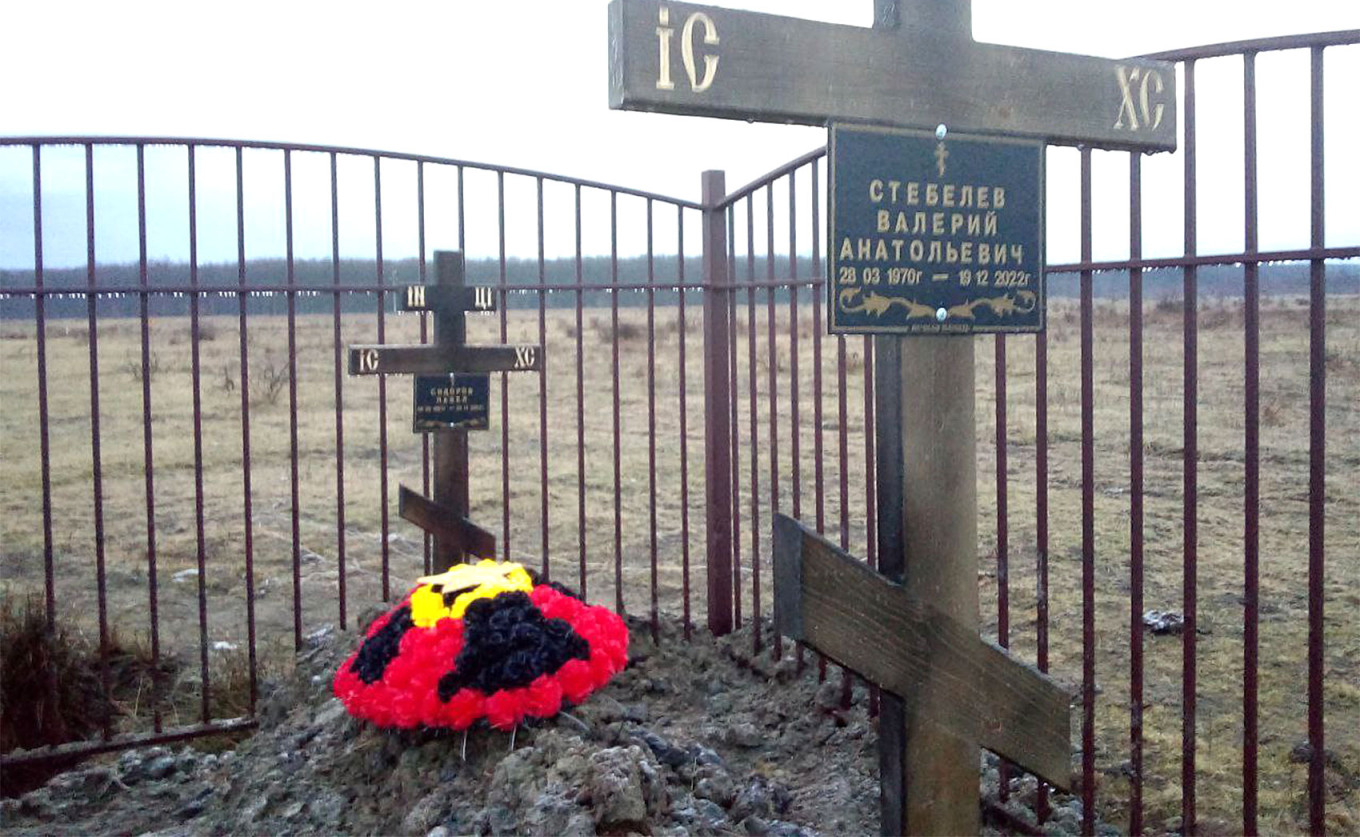
In early February, residents in the village of Kirovka, near the eastern Ukrainian city of Luhansk, discovered a burial site containing what appeared to be 42 Wagner graves.
None of the buried individuals were known to the locals in the area, which has been controlled by Russian forces since 2014.
BBC journalists matched grave inscriptions to the identities of 37 men, some of whom were former inmates who signed up to fight with Wagner back in August.
One of the men was a native of Belarus, while another was from the Central Asian country of Uzbekistan.
A Message from The Moscow Times:
Dear readers,
We are facing unprecedented challenges. Russia's Prosecutor General's Office has designated The Moscow Times as an "undesirable" organization, criminalizing our work and putting our staff at risk of prosecution. This follows our earlier unjust labeling as a "foreign agent."
These actions are direct attempts to silence independent journalism in Russia. The authorities claim our work "discredits the decisions of the Russian leadership." We see things differently: we strive to provide accurate, unbiased reporting on Russia.
We, the journalists of The Moscow Times, refuse to be silenced. But to continue our work, we need your help.
Your support, no matter how small, makes a world of difference. If you can, please support us monthly starting from just $2. It's quick to set up, and every contribution makes a significant impact.
By supporting The Moscow Times, you're defending open, independent journalism in the face of repression. Thank you for standing with us.
Remind me later.



